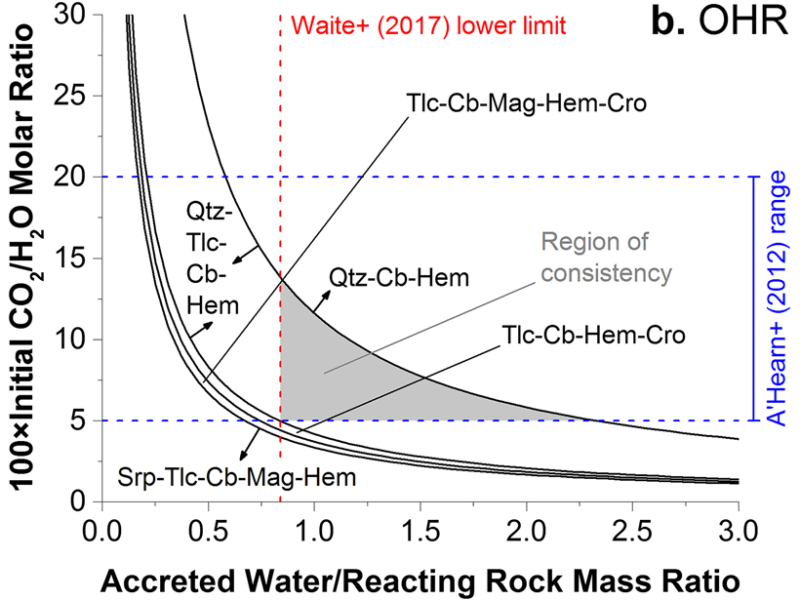The Freshest Mineral Water in the Solar System
The water-rich plumes erupting from Saturn's moon Enceladus show the chemical signs of water-rock interactions deep within the moon, further implicating Enceladus as a potential habitat for life.
SOURCE: Geophysical Research Letters

This figure shows whether assemblages containing quartz, talc, and carbonate can be produced from an oxidized hydrous rocky core under plausible conditions for Enceladus. Credit:Glein and Waite [2020], Figure 3b
Enceladus, a small moon of Saturn, shows remarkable activity for its size and likely possesses an ocean. Notably, a series of subparallel ridges at the south pole were seen by NASA's Cassini spacecraft to be venting copious water-rich plumes into space. How these plumes originate and what geochemical processes was the water subjected to before eruption are currently uncertain, and Cassini could only see and sniff (via mass spectrometry) Enceladus from the outside.
Glein and Waite [2020]perform a new geochemical analysis of the plumes, finding a most consistent result that has the originating water interacting directly with silicates in the core. Water dancing with rocks is a common theme for astrobiology, so these results further support the notion that Enceladus might harbor life beyond the Earth. The signature for biology could also be erupted with the waters. Therefore, future spacecraft that would fly though the plumes with instruments tuned for life could find supporting evidence without the bother of having to dig into the subsurface.
Citation: Glein, C. R., & Waite, J. H. [2020]. The carbonate geochemistry of Enceladus' ocean.Geophysical Research Letters, 47, e2019GL085885.https://doi.org/10.1029/2019GL085885
—Andrew Dombard, Editor, Geophysical Research Letters
AGU发布最新国外工作学习机会:
1. PhD Position (m/f/d) in the Area of Air-Sea Interaction
Geesthacht, Schleswig-Holstein (DE)
An appropriate salary related to the German public tariff (TV-AVH) plus the usual social benefits
Helmholtz-Zentrum Geesthacht (HZG)
We conduct materials and coastal research.
2. Modeling Ocean Biogeochemical Argo Observations Research
Princeton, New Jersey (US)
Princeton University
The Atmospheric and Oceanic Sciences Program at Princeton University in cooperation with NOAA's Geophysical Fluid Dynamics Laboratory (GFDL) seeks a postdoctoral research associate or more senior scientist to assess modes of variability in biogeochemical observations and assess the necessary scope of observations to constrain boundary conditions and underlying biogeochemical functioning towards improved predictability of living marine resources.
3. Online Master of Science (MS) Opportunities
Athens, Ohio
Department of Geological Sciences Ohio University
We invite applications to its online, non-thesis Master of Science program for the Fall of 2020.



